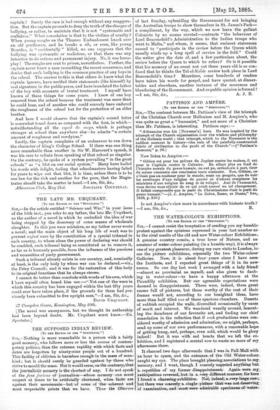PATTISON'. AND AMPERE.
[TO THY EDITOR OP THE " SPECTATOR.",
Sin,—The contrast between Mr. Pattison's view of the triumph of the Christian Church over Hellenism and M. Ampere's, whowas quite as great a "'humanist," and not more of a Christian than Me. Pattison, is interesting. Pattison Says:—
" Athanasins was his [Newman's] hero. He was inspired by thetriumph of the Church organisation-over the wisdom and philosophy of the-Hellenic world ; that triumph, which to the Humanist is the saddest moment in history—the rain of the painfully-constructed fabric of civilisation to. the profit of the Church.-"—("Pattison's= Memoirs," p. 96;) Now listen_to Ampere :— " Gibbon est. pour les pretres de Jupiter contra les moines,,i1 est. pour le Capitols contra le Calvaire. En anent plus an fond del'histoire morale du genre bumain, on ent pu, orthodoxie k part, tirer du memo contraste une conclusion tonte contraire. Non, Gibbon, co-n'etait panummalheur pour lemonde, undo un, progres, quo de voirles servitenrs d'une religion de purete at d'amour remplacer lea ministres d'une religion de sang at de volupte. Ami de l'humanite, vous deviez vous rejouir de ce qui avait amend' nn tel changement. Ii fallait comprendre clue le parti du Cbrisbianisme 6tait le parti du genre bumain."—(J. J. Ampere; " La Greve, Rome, et Dante," 8vo,. 1859, p. 210.) Is not Ampere's view more in accordance with-historic truth ?
—I am, Sir, &c., R.


































 Previous page
Previous page